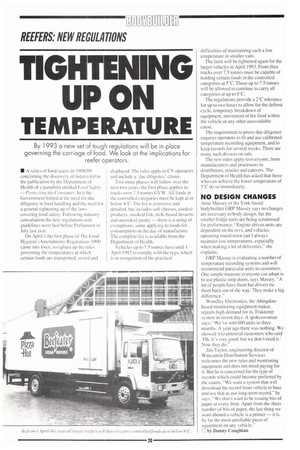TIGHTENING UP ON
Page 104

If you've noticed an error in this article please click here to report it so we can fix it.
TEMPERATURE
By 1993 a new set of tough regulations will be in place governing the carriage of food. We look at the implications for reefer operators, • A series of food scares in 1988/89 concerning the discovery oflisteria led to the publication by the Department of Health of a pamphlet entitled Food Safety — Protecting the COMffiller. In it the Government hinted at the need for due diligence in food handling and the need for a general tightening up of the laws covering food safety. Following industry consultation the new regulations and guidelines were laid before Parliament in July last year. On April I the first phase of The Food Hygiene (Amendment) Regulations 1990 came into force, to tighten up the rules governing the temperatures at which certain foods are transported. stored and
displayed. The rules apply to CV operators and include a 'due diligence clause.
Two more phases will follow over the next two years: the first phase applies to trucks over 7.5 tonnes CiVW. All foods in the controlled categories must be kept at or below C. The list is extensive and detailed. but includes soft cheeses, cooked products. smoked fish. milk-based desserts and uncooked pastry — there is a string of exemptions, some applying to foods for consuniption on the day of manUfacture. The complete list is available from the Department of Health.
Vehicles up to 7.5 tonnes have until I April 1992 to comply with the regs. which is in recognition of the practical difficulties of maintaining such a low temperature in smaller vans.
The limit will be tightened again for the larger vehicles in April 1993. From then trucks over 7.5 tonnes must be capable of holding certain foods in the controlled categories at 5°C. Those up to 7.5 tonnes will be allowed to continue to carry all categories at up to 8°C.
The regulations provide a 2°C tolerance for up to two hours to allow for the defrost cycle, temporary breakdown of equipment, movement of the food within the vehicle or any other unavoidable cause.
The requirement to prove due diligence requires operators to fit and use calibrated temperature recording equipment, and to keep records for several weeks. There are many such devices on sale.
The new rules apply to everyone, from manufacturers and processors to distributors, retailer and caterers. The Department of Health has asked that those who can achieve the lower temperature of 5°C do so immediately.
NO DESIGN CHANGES
Anne Massey of the York-based bodybuilder GRP Massey says no changes are necessary to body design, but the smaller fridge units are being scrutinised for performance. "Engine-driven units are dependent on the revs, and'vehicles operating round town can't always maintain low temperatures, especially when making a lot of deliveries," she explains.
GRP Massey is evaluating a number of temperature recording systems and will recommend particular units to customers. One simple measure everyone can adopt is to use plastic strip doors, says Massey. "A lot of people have them but drivers tie them back out of the way. They make a big difference."
Woodley Electronics, the Abingdonbased monitoring equipment maker, reports high demand for its Truktemp system in recent days. A spokeswoman says: "We've sold 600 units in three months. A year ago there was nothing. We showed it to potential customers who said 'Oh, it's very good, but we don't need it.' Now they do."
Jim Taylor, engineering director of Wincanton Distribution Services welcomes the new rules and monitoring equipment and does not mind paying for it. But he is concerned for the type of records which could become preferred by the courts. "We want a system that will download the record from vehicle to base and use that as our long-term record," he says. "We don't want to be issuing bits of paper at every drop. Apart from the sheer number of hits of paper, the last thing we want aboard a vehicle is a printer— it is by far the most unreliable piece of equipment on any vehicle."
E by Danny Coughlan












































































































